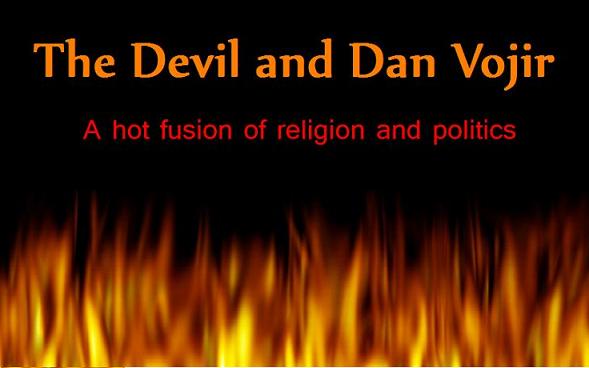The Monday Sermon: Is Freedom Of Religion A Blessing ...Or A Curse?
The protection of religious freedom has also become a matter of debate. It strikes me as odd that the free exercise of religious faith is sometimes treated as a problem, something America is stuck with instead of blessed with. Perhaps religious conscience upsets the designs of those who feel that the highest wisdom and authority comes from government."- Mitt Romney, speaking at the commencement exercises of Jerry Falwell's Liberty University
Social conservatives (aka the Christian Right) have been vocal about Freedom of Religion within political circles - freedom to practice the Christian religion as the One True religion and the freedom to participate in politics. For without their involvement in government, they think they might lose their freedom of religion. In order to participate in politics, they argue, there must be no separation of church and state. One article of the First Amendment must, in essence, negate the other. Yes, it's rather confusing, but we're dealing with an entity that deals with ill reasoning and confusion on a daily basis.
Which Religion Should Have The Right?
Freedom of Religion sounds like a right. It is. So is the freedom NOT to have any particular spiritual belief. But freedom of religion, like everything else involved in the socio-political sphere depends upon which religion is the dominant one. If that religion is truly tolerant of other religions, then everyone will have both freedom to believe in any moral/spiritual code they wish and the freedom to PRACTICE that code. The latter may be called Free Exercise.
It can be safely said, therefore, that while the Christian Right says they are for freedom of religion, they are, in fact, for freedom to believe and practice Christianity only. Yes, we see the religious intolerance everywhere:
- "Ex-Homosexual" DL Forster has stated flatly that there is no such thing as a gay Christian. His ministry Witness Ministries, maintains a website that considers itself a watchdog against any churches or organizations that accept gays.
- C. Peter Wagner, founder of New Apostolic Reformation movement, warns about "heathen" idols. Hence, he goes about smashing Native American artifacts and statues of Catholic saints.
- Pastor John Benefiel posits that the Statue of Liberty is an idol and some of his adherents have called for its demolition.
- Pastor Dennis Terry received a modicum of fame for his introduction of Rick Santorum: in it he vehemently bloviated that American was "Christian Nation" and not beholding to any other religion whereupon he told the "naysayers and liberals" to "Get Out!" His later non-apology and insistence that as a Christian he really loved everyone was criticized as disingenuous... at best.
- C. Peter Wagner, founder of New Apostolic Reformation movement, warns about "heathen" idols. Hence, he goes about smashing Native American artifacts and statues of Catholic saints.
- Pastor John Benefiel posits that the Statue of Liberty is an idol and some of his adherents have called for its demolition.
- Pastor Dennis Terry received a modicum of fame for his introduction of Rick Santorum: in it he vehemently bloviated that American was "Christian Nation" and not beholding to any other religion whereupon he told the "naysayers and liberals" to "Get Out!" His later non-apology and insistence that as a Christian he really loved everyone was criticized as disingenuous... at best.
The Bully Pulpit
Yes, it's ironic that the very people who focus on freedom of religion do not believe in freedom for religion. It's ironic that a religion based on love and tolerance has sects and denominations that are not tolerant in the least, whether to other religions or other facets of Christianity. Far more Christians have persecuted other Christians than Christianity as a whole has been persecuted. The dizzying array of "sects" "cults" and "heretics" ostracized by organized segments of Christianity magnifies the fact that certain Christians are incapable of freedom of religion with their own let alone other religions like Hinduism, Buddhism, Judaism or Islam.
One wonders that if certain evangelicals (read: Dominionists) get their way, just how many Mormons and Catholics will be persecuted, let alone Muslims, Jews, Hindus, Buddhists, Sikhs, Scientologists, and Moonies.
"You say you're supposed to be nice to the Episcopalians and the Presbyterians and the Methodists and this, that, and the other thing. Nonsense, I don't have to be nice to the spirit of the Antichrist." -- Pat Robertson, The 700 Club, January 14, 1991
Belief vs Exercise
When the Founding Father drafted the First Amendment, Freedom of Religion was actually more like Freedom FROM Religion in that it was a distinct reaction to hold the Church of England (Anglican) held on the colonies:
"Congress shall make no law respecting an establishment of religion, or prohibiting the free exercise thereof." So the Christian Right hates the first part, but takes advantage of the second part: in it, "belief" is only assumed, while "exercise" is more explicit. Any "Belief" can be castigated, while the act of bludgeoning anyone over the head with a Bible cannot. Had the Amendment said that every man had the freedom to believe what he wanted, but not the freedom to proselytize to the the detriment of another's beliefs, then it might have served Americans much better throughout it's freedom-loving history.
For it is with the exercise of beliefs that the Christian Right has gained the upper hand politically and has gained power over all other sects, denominations and religions: its organizations (like the Family Research Council) and media (Christian Broadcasting Network and Glenn Beck) and promotions (OpEd letters and billboards) trumpet "values" that instill fear of any other belief or creed.
In other words, the second part of the Amendment has unleashed a monster against the first part and against religious tolerance. And only by strengthening the first part, can we ever hope to achieve true freedom of religion.






No comments:
Post a Comment